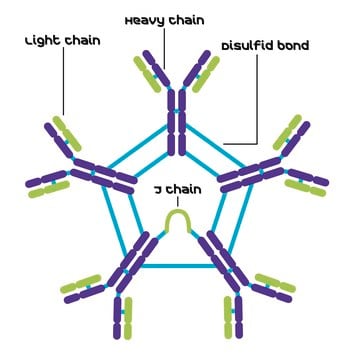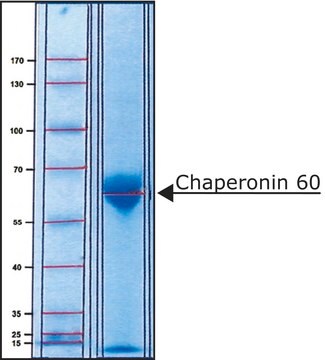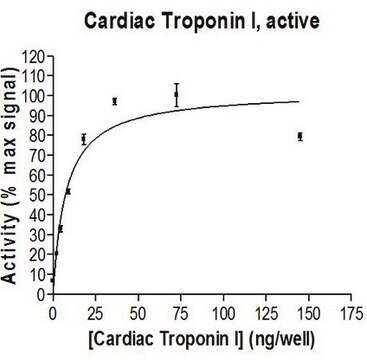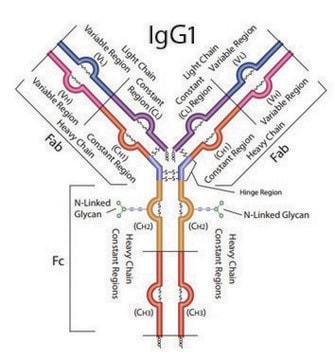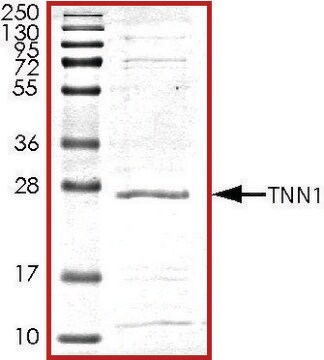M5170
IgM, Lambda from murine myeloma
clone MOPC 104E, purified immunoglobulin, buffered aqueous solution
Sinónimos:
Mouse IgM-λ
Iniciar sesiónpara Ver la Fijación de precios por contrato y de la organización
About This Item
Productos recomendados
origen biológico
mouse
Nivel de calidad
conjugado
unconjugated
forma del anticuerpo
purified immunoglobulin
clon
MOPC 104E, monoclonal
Formulario
buffered aqueous solution
Condiciones de envío
dry ice
temp. de almacenamiento
−20°C
modificación del objetivo postraduccional
unmodified
¿Está buscando productos similares? Visita Guía de comparación de productos
Descripción general
IgM antibodies are present as pentamers in the serum and are produced in response to antigens
IgM, λ from murine myeloma is produced by MOPC 104E tumor line introduced subcutaneously in BALB/c mice. It specifically recognizes mouse IgM, λ. Identity and purity of the immunoglobulin is established by immunoelectrophoresis.
IgM, λ from murine myeloma is produced by MOPC 104E tumor line introduced subcutaneously in BALB/c mice. It specifically recognizes mouse IgM, λ. Identity and purity of the immunoglobulin is established by immunoelectrophoresis.
Especificidad
Antigen Specificity: α(1→3) glucose
Aplicación
IgM, λ from murine myeloma was used as standard in ELISA and as isotype control in immunohistochemistry applications.
Acciones bioquímicas o fisiológicas
IgM antibodies are produced initially during B-cell development. IgM participates in opsonization and compliment fixation. Defect in IgM production is observed in X-linked agammaglobulinemia.
Forma física
Solution in 0.05 M Tris, 0.5 M sodium chloride, pH 8.0, containing 0.02% sodium azide
Cláusula de descargo de responsabilidad
Unless otherwise stated in our catalog or other company documentation accompanying the product(s), our products are intended for research use only and are not to be used for any other purpose, which includes but is not limited to, unauthorized commercial uses, in vitro diagnostic uses, ex vivo or in vivo therapeutic uses or any type of consumption or application to humans or animals.
Código de clase de almacenamiento
10 - Combustible liquids
Clase de riesgo para el agua (WGK)
nwg
Punto de inflamabilidad (°F)
Not applicable
Punto de inflamabilidad (°C)
Not applicable
Elija entre una de las versiones más recientes:
¿Ya tiene este producto?
Encuentre la documentación para los productos que ha comprado recientemente en la Biblioteca de documentos.
Establishment of fetal bovine intestinal epithelial cell cultures susceptible to bovine rotavirus infection
Kaushik RS et al
J. Virol. Methods, 148, 182-196 (2008)
Jason R Nesbitt et al.
Frontiers in microbiology, 8, 2706-2706 (2018-02-07)
Aspergillus fumigatus is a filamentous fungus that can cause a life-threatening invasive pulmonary aspergillosis (IPA) in immunocompromised individuals. We previously characterized an exo-sialidase from A. fumigatus that prefers the sialic acid substrate, 2-keto-3-deoxy-D-glycero-D-galacto-nononic acid (Kdn); hence it is a Kdnase.
D R Wilson et al.
Protein engineering, 10(5), 531-540 (1997-05-01)
The immunodominant region of the Plasmodium falciparum circumsporozoite protein is comprised mainly of a series of tetrapeptide repeats that can, depending on the starting cadence chosen, be described as (NANP)n, (ANPN)n, (NPNA)n or (PNAN)n in one-letter amino acid code. Data
Radhey S Kaushik et al.
Journal of virological methods, 148(1-2), 182-196 (2008-01-12)
Mucosal epithelial cells are infected by a wide variety of pathogens and determining their response to infection is critical for understanding disease pathogenesis. A protocol was developed for culturing primary epithelial cells from fetal bovine intestine and the cultured cells
Chithra C Sreenivasan et al.
Virology, 528, 152-163 (2019-01-08)
Influenza viruses are a group of respiratory pathogens that have evolved into four different types: A, B, C, and D. A common feature is that all four types are capable of replicating and transmitting among pigs. Here, we describe the
Nuestro equipo de científicos tiene experiencia en todas las áreas de investigación: Ciencias de la vida, Ciencia de los materiales, Síntesis química, Cromatografía, Analítica y muchas otras.
Póngase en contacto con el Servicio técnico